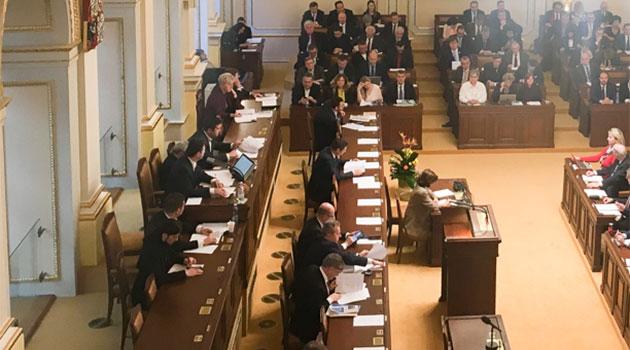Czech lower house approves budget, SPD did not succeed to reduce financing for Romani integration

The Czech lower house has approved the state budget for 2018, reducing the approved deficit compared to last year by CZK 10 billion to CZK 50 billion. The MPs added CZK 3.3 million in social services, CZK 1 billion to support the agricultural food complex, and CZK 300 million for investment into nursery and primary schools.
Legislators rejected the populist proposals of Okamura’s SPD movement to lower the budget for the program for Romani community integration and also rejected the Civic Democratic Party (ODS) suggestion that funding for multicultural education be cut. The budget counts on income of CZK 13,145,000,000,000 and expenditures of CZK 50 billion more than that.
On 19 December the budget was sent to the President of the Republic for his signature and was signed on 20 December, according to the Czech News Agency. The Senate is not involved with approval of the budget in the Czech system.
There were 140 MPs in favor of the budget, including some from the previous governing coalition of ANO, the Christian Democrats (KDU-ČSL), and the Czech Social Democrats (ČSSD), who were joined by MPs from the Communist Party of Bohemia and Moravia (KSČM) and the SPD. Those against the budget were ODS and TOP 09.
Those abstaining were the Pirates, with the exception of MP Lenka Kozlová, who supported it, and the STAN club. Overall the MPs reallocated about CZK 7 billion, or approximately 0.5 % of the planned expenditures.
Two proposals to increase money for social services by a total of CZK 3.3 billion passed with massive support across the parties. The support for that reallocation had been agreed prior to voting by the parties in the former governing coalition.
The lower house also added CZK 100 million for the “special schools” to buy textbook aides for profoundly disabled pupils. On the other hand, Okamura’s SPD movement did not succeed with its proposal to cut the program for integrating members of the Romani community by CZK 13 million after arguing that the program is discriminatory against non-Romani children.
A total of 47 MPs voted for that proposal – all 22 SPD MPs, 23 ODS MPs, and one MP each from the Communists and STAN. MP Zuzana Majerová Zahradníková (ODS) also failed to reduce the budget for the program of support for education in the languages of national minorities and multicultural education.
A total of 50 MPs voted for that proposal – again, all the SPD MPs, all the ODS MPs, and two MPs each from the Christian Democrats and STAN. MP Karel Krejza (ODS) tabled a similar proposal that also failed.
A total of 51 MPs voted for Krejza’s version. Those in favor were, again, all the SPD MPs, 23 ODS MPs, and all of the STAN MPs (six).
MP Jakub Janda (ODS) did not succeed with his proposal to take CZK 7 million away from non-governmental, non-profit organizations in the area of equality between men and women and to reallocate that money to sports. Mikuláš Ferjenčík (Pirates) did not manage to convince legislators to cut more than CZK 1 million for the Office of the Czech President spent on security measures at Prague Castle and to invest the money instead into the prevention of alcoholism.
MP Tomio Okamura, just before the final vote on the budget, once again verbally attacked nonprofit organizations and used Fascist vocabulary to refer to some inhabitants of the Czech Republic. “We have big reservations about this budget. On the one hand, we disagree with such an enormous deficit during a time of economic growth, and we also disagree with the gigantic sums of money that will flow next year to nonprofit organizations with a political program, and we disagree with social benefits and social welfare being given to inadaptable, parasitic groups of inhabitants instead of that money going to decent, ordinary citizens,” Okamura said in the plenary session.
The budget had been drafted by the previous administration of Bohuslav Sobotka (ČSSD) but was not approved until after the October elections returned the new lower house to Parliament, and the new Government led by Andrej Babiš (ANO) will now manage the budget accordingly. The PM Babiš reminded the MPs on 19 December that the budget is not the work of his Government.
The right wing had reservations about the budget – for example, TOP 09 wanted to return it to the Government during the first reading with a proposal to reduce both the deficit and expenditures. The chair of TOP 09, Miroslav Kalousek, said on 19 December that his party considers the budget’s expenditures unforgivably high.
According to ODS the budget is not ambitious enough and is uneconomical given the opportunities afforded by the country’s economic growth. Jan Bartošek (KDU-ČSL) said that for his party it was crucial to increase money for social services, which was why they supported the budget.
The head of the ČSSD faction in the lower house, Jan Chvojka, said his party considered the budget balanced, good, and high-quality. On the other hand, Jan Farský (STAN) declared that to currently work with a deficit of CZK 50 billion was irresponsible with respect to the future.
The lower house also supported a future increase to expenditures by the Education Ministry for colleges and for regionally-administered schools. Legislators had already recommended the Government increase teachers’ pay by 15 % as of September and raise pay for other education workers by 10 %.
MPs did not approve of the Pirates’ proposal to create a version of the budget that citizens could access online by June 2018. The 2018 budget is based on an estimated economic growth of 3.1 %, while last year GDP grew by just 2.4 %.
The Government says the Czech economy is benefiting from favorable domestic and international conditions. On the other hand, the Government is also warning of the risks that could arise from a further significant growth in real estate prices.
The growth of international trade barriers sparked by Brexit is considered a significant risk. Other negative factors mentioned by the Government are the risk of the Chinese economy decelerating or problems in the Italian banking sector.
The Government hopes to collect CZK 722 billion in tax next year, which is a growth of roughly CZK 35 billion compared to 2017’s estimated revenue. More than CZK 434 billion of that revenue is allocated to pensions.
